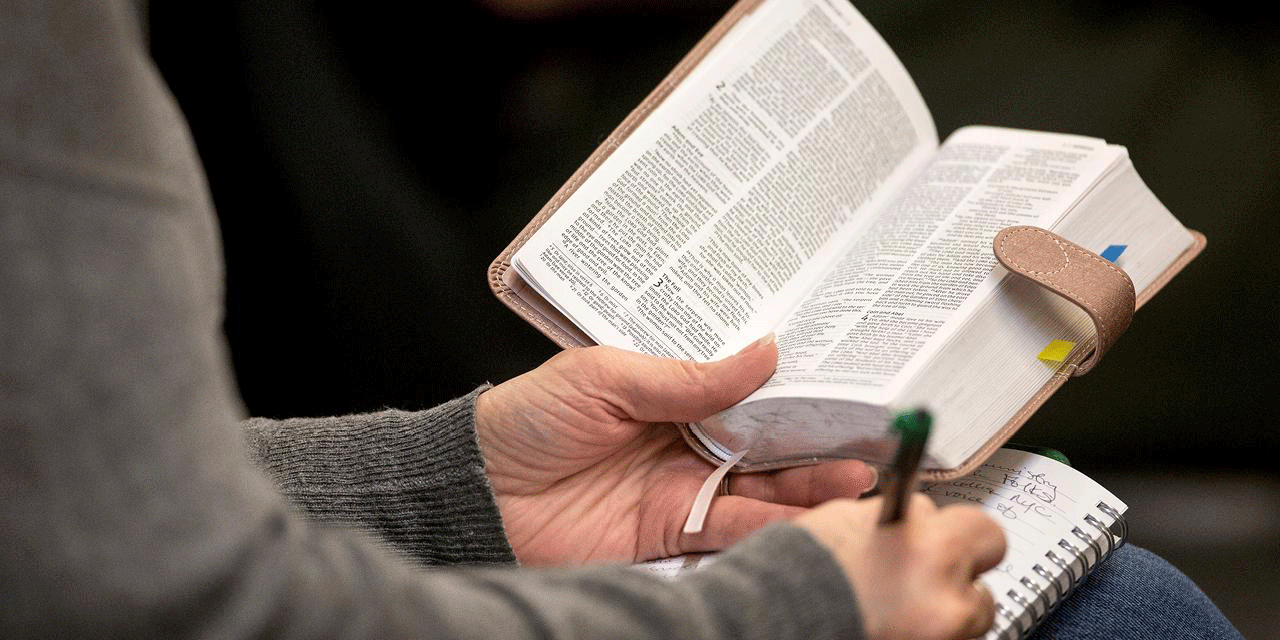Confirmed into the Anglican Church at age 13 in 1965, I genuinely enjoyed my young years in the church. God was with me. However, later I went through what I called those “lost teen years. “I always knew I would return. I never forgot my church, and I did return. I became a dedicated Christian in 1981, married in 1982. I served on church council for several years. As a warden I co-led the amalgamation of two churches in Calgary. I was a reader of the Sunday readings. I studied a lot of Christian books. All these steps opened my mind and heart to God. However, these callings did not connect me to the full story of God. I needed more and the years were flying by.
In 2010, we retired to the Okanagan and began attending St. George’s Anglican Church, West Kelowna and continued in our worship. I began to realize that I avoided the Bible like it was the elephant in the room. This is when our parish priest, Reverend Roger Cooper introduced me to Education for Ministry (EfM) in 2016, I realized a structured study plan with a qualified mentor was exactly what I was looking for. I committed to the 4-year program.
This is the best way to study the Bible and related topics in a shared group setting with a trained mentor. Important note: the Bible used in the EfM Canada program is The New Revised Standard Version of The Oxford Annotated Bible with the Apocrypha with valuable notes and comments to help the reader better understand the text. As I enrolled in the EfM group, I was growing spiritually and was drawn closer to God because of many aspects of the program beyond just Bible study, and to the people in my group. I now feel more fulfilled with God’s love than ever before. I also have life-long, like-minded Christian friends from my group as well as many from our parish to draw on. I also now see myself as part of God’s story.
The historical aspect of the Bible especially drew me in. It led me to see and hear God in my heart. As I studied the Old Testament, I found it was not Sunday school level learning. Each book dwells deeply into every person in the Bible either as an Israelite or other cultures. These are some of the historical things you will learn as I did.
Simply combined these books are the Bible. If one genuinely wants to learn the Bible, each one must immerse themselves in the Bible. Students must grapple with everything the Bible throws back at them. Some books of the Bible include pain and murder, others bring out love and lessons.
In the study of the Old Testament the official EfM study book, “A Short Introduction to the Hebrew Bible” states the Protestant Old Testament has 39 books and is referenced as the Roman Catholic Canon, which has forty-six books and the differences in them and why things were left out or added. I learned The Hebrew Bible, fully translated into Greek from Hebrew in the third to second century B.C., which became the Old Testament. The Israelites had no interest in using Greek. I learned in detail so many interesting stories, facts, lessons, poems, and songs in the Old Testament. I learned to understand the unusual chronological order of the Old Testament. I learned how the Torah, or the first five books of the Hebrew Bible is not so different from the Pentateuch of the Protestant Old Testament. I learned from The Old Testament how Jewish religious leaders demanded all traditions and laws be adhered to without question, even up into the time of Jesus’ teachings, as described in the New Testament. l learned about the predictions of the coming of a Messiah in the Old Testament, I studied The Exodus, the Era of the Judges of Israel, the Kings of Israel, Book of Ruth, King David, The Prophets, Book of Jonah and much more.
As you will see The New Testament has twenty-seven individual books, written between 60 A.D. to 120 A.D. The New Testament was divided into several groups. First, the Gospels of Matthew, Mark, Luke, and John. The gospels describe Jesus’ mission in the world, and his eventual crucifixion and resurrection. Secondly, the Acts of the Apostles, also written by Luke as a companion piece to his Gospel. This book describes the early activities of the emerging church and introduces the story of the disciple Paul. Thirdly, the letters, or epistles attributed to Paul. These are the earliest writings we have in the church. Most of Paul’s letters were written well before the creation of the Gospels. These letters helped to establish the churches to which Paul was writing. As well as letters to other co-workers, the church in Rome, and the Hebrews. Fourthly, there are short letters attributed to the apostle Peter, Jesus’ brother James, Jude, and the apostle John. Finally, the prophetical The Book of the Revelation to John, an example of apocryphal literature (also attributed to John, although written much later). As with the Old Testament, to aid in understanding our faith, you study the New Testament in a biblical order and not chronologically. The gospels play a significant role in this. Learn what Jesus teaches us from the Beatitudes. Learn from Matt. 22, 37-39, how we are to love The Lord our God with all our hearts mind and soul. This is the first commandment. The second is like unto to it: Love your neighbour as yourself. All the laws and prophets hang on these two commandments. How Jesus asked Peter to build his Church on a rock. The gospels go on to describe how and why Judas betrayed Jesus, which led to his death, then the Resurrection, and the redemption of humankind for our sins. In Acts, you learn how Saul was named Paul and spread Jesus’ word.
There is a multitude of resources supporting the Old and New Testament Bible. These resources are available to everyone if they are willing to do the searching. Every word, statement or event can and does become a book or a hymn. God’s Word is as endless as time and space. Critical enquiry is important in ensuring the validity of the information we obtain. It helps to search out multiple sources of information, and to listen to disagreeing points of view before moving on.
Most importantly it is always good to bring prayer into your study plans. Start by addressing God. Ask God for wisdom and understanding. Ask for specific guidance to your life as a Christian. Praying shows God, you are humble and open to God’s help and direction. Studying the Bible expands your knowledge and understanding beyond what you learn in your church. Studying the Bible is a bold undertaking. It lets God into your work.
The EfM Canada program is celebrating its 40th anniversary. EfM Sewanee (USA) will be celebrating their 50th anniversary. Please follow the website of EfM Canada for all pertinent course information. Ongoing updates and registration information to follow. You may call Annette Cowan, Director EfM Canada at 1-778-478-8313.
I encourage each of you to accept this challenge for yourself, You will determine what comes from studying the Bible and beyond. What you learn will last a lifetime and more.
May God bless you on your Christian journey.
References: The New Revised Standard Version of The Oxford Annotated Bible with the Apocrypha.
EfM study book, “A Short Introduction to the Hebrew Bible,” Author: John J. Collins.
Annette Cowan, Director EfM Canada and the EfM Canada website.


